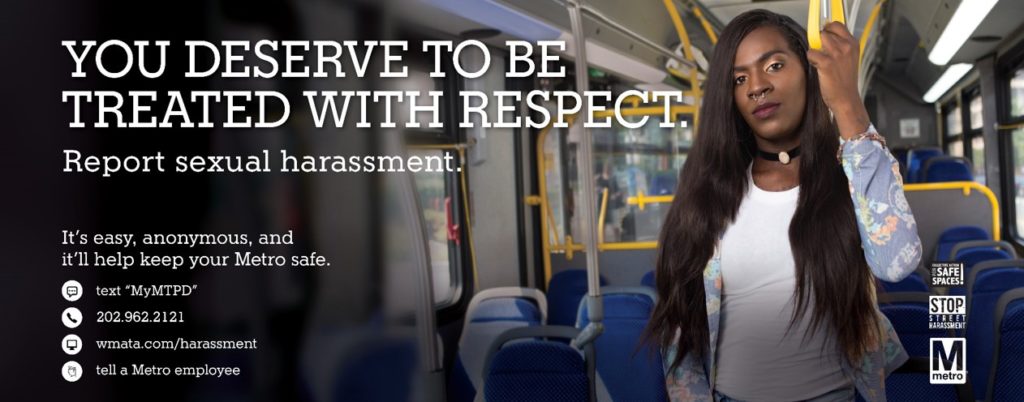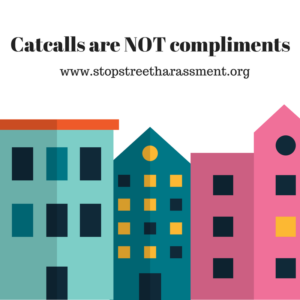Cross-posted from PreventConnect for International Anti-Street Harassment Week. Its author Meghna Bhat is a former SSH Blog Correspondent. She also hosted a podcast episode with Holly Kearl of SSH and Jessica Raven of Collective Action for Safe Spaces (CASS) to talk about the anti-harassment transit campaign in the Washington, D.C. area.
Being born and raised in India, I assumed only young girls and women in my city experienced and witnessed multiple forms of sexual harassment in our country, especially on the streets and in public transit. Until I arrived in the U.S. in 2004 and continued to read about sexual violence, especially the blogs at Stop Street Harassment, I realized that street harassment is unfortunately prevalent all around the world in shared public spaces. Street harassment, often a troubling factor attributing to sexual violence and physical harassment, is often trivialized and normalized due to being a part of our everyday lives. Being catcalled, groped and grabbed, physically and sexually assaulted, stalked or exposed to flashings and lewd gestures are all types of street harassment. We often overlook the most troubling fact — most of us experience it everyday in our commutes, parks, walks, drives, bike rides and many more avenues. Imagine the trauma, the impact, and future implications on the lives of those affected and victimized.
Street harassment is also intersectional in nature as it often connects with sexual and domestic violence, racism, homophobia, sexism, ableism, transphobia, reproductive injustice, Islamophobia, and other forms of oppressions.

Denying and trivializing the prevalence and the traumatic impact of street harassment on our communities continues to contribute to the hostile, negative, and misogynistic environment for young girls, women, and trans women. Unfortunately,when it comes to preventing street harassment and other related forms of sexual violence, the victims/ survivors are often held accountable for their victimization and are taught ways to prevent the harassment. Many women have been taught to be aware and cautious of their surroundings, and some have even learned self-defense, in an effort to increase their sense of safety and strength. These things are important, but when young girls and women are frequently asked to dress ‘appropriately’, asked to smile when catcalled, not to stroll ‘alone’ outside in the dark, always be with a friend in public, not to be ‘alone’ at bars, parks and other shared spaces– it contributes to rape culture and perpetuates sexual and domestic violence. Gendered policing and victim-blaming are not going to help prevent street harassment.

(L to R): Jason Minser, Jessica Raven, Lynn Bowser, Holly Kearl, Deputy Chief Leslie Campbell, and Morgan Dye
This week (April 2-8, 2017) marks the 7th year of the International Anti-Street Harassment Week. In order to prevent and end  the cycle of street harassment, we can take the following steps:
the cycle of street harassment, we can take the following steps:
- Collectively shift the culture in how our society sees and responds to street harassment and sexual violence. We need to identify protective factors and effective ways to change these harmful gender and social norms that condone harassment, sexism, and other forms of oppressions.
- Take action: Get inspired by examples of events and activities of how other activists around the world are resisting and challenging street harassment in their towns. Take a look and see how you can adapt the elements of collaboration and community organizing to stop street-harassment in your community and town.
- Share resources with survivors and communities: Those who has experienced street harassment and need help, can call toll-free: 855-897-5910 or click here for online hotline. You can find other resources here through Stop Street Harassment or read stories shared by other victims/ survivors of their experiences on Collective Action for Safe Spaces.
- The month of April also marks Sexual Assault Awareness Month (SAAM): It is important we recognize how street harassment, an often overlooked and minimized form of sexual harassment, is connected to sexual violence and other types of systemic and institutional oppressions. Check out how you can get involved.
